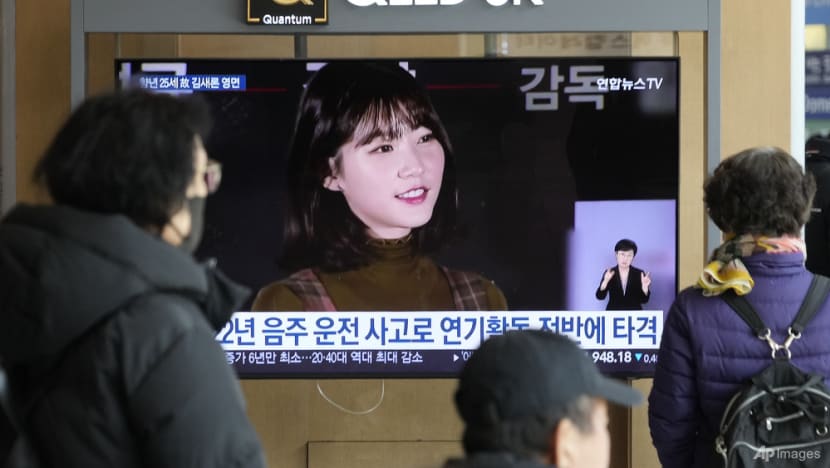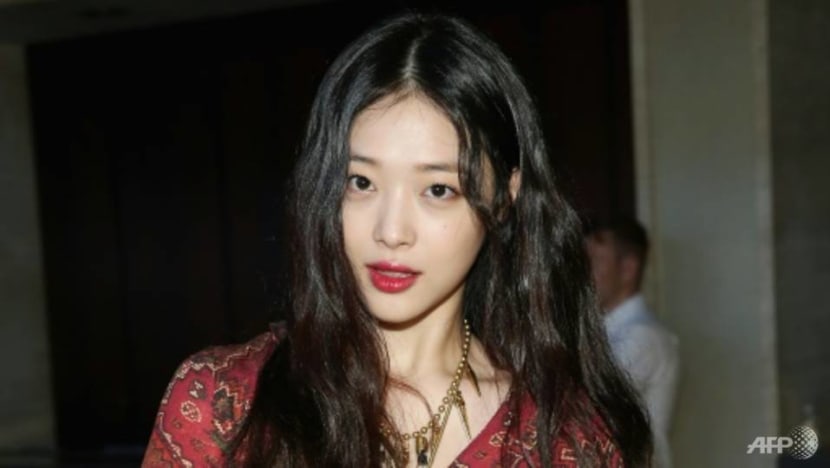Commentary: After high-profile South Korean idol deaths, has the industry changed for the better?
Despite calls for reform, K-entertainment stars are still held to impossible standards of moral purity – sometimes fatally so, says communications strategist Maelyn Lagman.


This audio is generated by an AI tool.
SINGAPORE: It’s been close to a decade since the glossy facade of South Korea’s entertainment industry cracked under the weight of tragedy. In 2017, SHINee’s Kim Jong-hyun died by suicide, followed by f(x)’s Sulli and Kara’s Goo Hara in 2019, just six weeks apart.
Each time, there were vigils, urgent calls for reform and vows that things would change. Yet, the cycle of loss continued.
In 2024, Parasite actor Lee Sun-kyun took his own life after facing a storm of media coverage over a drug investigation. Just months ago, in February, actress Kim Sae-ron did the same after years of public and media backlash over her 2022 charge for driving under the influence. Up until her death, her every move was scrutinised and ridiculed both in the press and on social media.
So has anything really changed?
NO ESCAPE FROM DISGRACE
The K-entertainment industry remains an unforgiving space, where celebrities are expected to present and maintain an impossible standard of moral purity. A single misstep can lead to swift and brutal condemnation from the press, fans and the public at large.
Much of this stems from "chemyeon", the Korean concept of saving face. And to lose face is to lose everything. “Face-saving has been regarded as far more valuable to many Koreans than any other asset, including life itself,” explains Han Seong-yeul, an emeritus psychology professor at Korea University.
But public figures are not average individuals – they are extensions of their agencies, their families and even their countrymen. It’s deeply embedded into K-entertainment that disgrace must be met with absolute consequences, leaving little room for second chances.
Sulli was branded a troublemaker for going braless, speaking openly about feminism and dating freely. Goo Hara was the victim of an abusive ex-boyfriend who blackmailed her with an unreleased intimate video – however, when news of the video’s existence became public, she was the one ostracised.
Lee Sun-kyun was just one example of a celebrity bearing the brunt of merciless backlash even before wrongdoing is yet proven. Despite eventually testing negative for drugs, the accusations alone were enough to see him blacklisted and his projects cancelled.
When reputation and honour are valued above all else, disgrace becomes inescapable. And in many cases, the only perceived way out is death.
The rise of social media has only magnified these pressures, becoming modern-day courthouses where public figures are put on trial in real time.
Sometimes, these platforms make some effort to curb malicious attacks. After Sulli and Goo Hara’s deaths, Naver and Daum disabled comment sections and removed features like “related search keywords” and real-time trending searches related to individuals, both of which were often used to conduct online smear campaigns.
However, the toxicity rarely dissipated. It simply migrated to other platforms like YouTube, Twitter (now X) and Instagram.

SOME PROGRESS
Still, some progress has been made towards acknowledging mental health as a serious issue rather than a taboo topic.
In the past, mental illness was often framed as a personal weakness rather than a legitimate condition, and K-celebrities struggling with depression or anxiety were expected to endure it in silence, much like the generations before them.
Nowadays, in reports on celebrity controversies and struggles, many Korean media outlets now explicitly mention depression and anxiety instead of glossing over it as they did before. Some, such as the Chosun Daily and Korea Herald, even include suicide prevention resources in their articles.
Perhaps most significantly, K-celebrities have started opening up themselves. BTS’s Suga and RM, Epik High’s Tablo, and Girls’ Generation’s Taeyeon have all spoken publicly about battling depression and anxiety. GOT7’s Jay B and SHINee’s Key have shared their experiences with therapy, while soloist IU has talked about her struggles with burnout.
K-entertainers openly discuss their struggles on Get Real, a podcast by Dive Studios, co-founded by singer Eric Nam. Dive later launched Mindset, a self-care and mental wellness app featuring audio stories from local and international artists sharing their own mental health journeys.
This has also pushed entertainment agencies to rethink how they support their talent. More companies now publicly acknowledge mental health struggles, and it’s becoming more common for idols to take formal hiatuses to focus on their well-being – something that was once unheard of in the industry.
HYBE, the agency behind BTS, in 2022 opened the industry's first in-house healthcare centre, offering both mental and physical support to its artists. Other agencies have followed suit, providing access to therapy and counselling for talent, and cracking down on online harassment by taking legal action against malicious commenters.
A START – BUT ONLY A START
There’s a growing awareness that fame and wealth don’t shield individuals from mental health challenges. Instead of reacting with scepticism or dismissal, fans are now much more likely to be vocal online with support and encouragement.
But these changes only scratch the surface.
The industry still lacks structural protections such as unionisation or fixed working hours, leaving artists vulnerable to burnout. While agencies now allow mental health breaks, these are often reactive measures – granted only when an artist is visibly struggling – rather than part of a proactive system designed to prevent crises before they happen.
Without deeper reforms, mental health initiatives risk being little more than a public-relations safeguard rather than a true shift in how the industry operates.
At the policy level, lawmakers have attempted to introduce legal reforms to protect public figures from cyberbullying, such as the Sulli Act, which sought to require real-name verification for online comments in an effort to curb anonymous hate speech.
More recently, Parasite director Bong Joon-ho called for the enactment of “Sun-kyun’s Law” to guard against trial-by-media media practices, including the excessive and often reckless media scrutiny and smears before legal judgment is made.
CONDEMNATION VS ACCOUNTABILITY
Not all public scrutiny is inherently harmful. Some argue that celebrities like Kim Sae-ron, who was caught driving under the influence and put lives at risk, and actor Yoo Ah-In, found guilty of illegal drug use in 2023, deserve public criticism. But are knee-jerk reactions of condemnation equivalent to true accountability?
Public figures wield significant influence, and there is an expectation that they be held accountable for their actions. The issue is that K-fandom – and South Korean public opinion more broadly – often reacts to controversy with little distinction between different types of wrongdoing.
A celebrity caught breaking the law can face the same level of vitriolic judgment as one who made a poorly worded remark. Even dating rumours or visible weight gain in celebrities can trigger disproportionate amounts of public outrage.
But there’s a difference between senseless harassment that turns personal struggles into entertainment and holding public figures accountable for causing real harm and damage. Where is the line between justified criticism and undeserved persecution?
Some disgraced celebrities, particularly those with powerful agencies or strong fan support, have managed to stage comebacks, including Big Bang frontman G-Dragon, investigated for drug use in 2011, and actor Kim Seon-ho, embroiled in a personal scandal in 2021.
Most, however, are cast out permanently. Even when they take accountability for their missteps – whether by apologising or facing legal consequences – they are rarely afforded a clear path back into the good graces of neither the industry nor the public.
If South Korea’s entertainment industry is to truly change, there needs to be a middle ground. Celebrities should not be free from criticism, but more care must be taken to ensure that the nature and intensity of public scrutiny upon them is proportionate to the offence.
Most importantly, space must be preserved for rehabilitation – or, at the very least, basic compassion.
As human beings, we’re all flawed. The only two options cannot be perfection or exile.
Maelyn Lagman currently leads content strategy at a Singapore startup.
Editor's note: This article has been updated to correct a photograph caption which identified K-pop star Sulli as Goo Hara. We apologise for the error.


















